Welcome to Jiangsu DZX Factory.
Email:dlx@dlx-alloy.com Mobile/Whatsapp:+86 199 0611 9641
Professional manufacturer of welding wires and spraying wires,over 22 years.
Welcome to Jiangsu DZX Factory.
Email:dlx@dlx-alloy.com Mobile/Whatsapp:+86 199 0611 9641
Professional manufacturer of welding wires and spraying wires,over 22 years.
Contact:Jason
Whatsapp:+8619906119641
Email:dlx@dlx-alloy.com
Add:NO.32 West Taihu Road, Xinbei District, Changzhou, Jiangsu,China
Nickel Welding Wire
Product Details
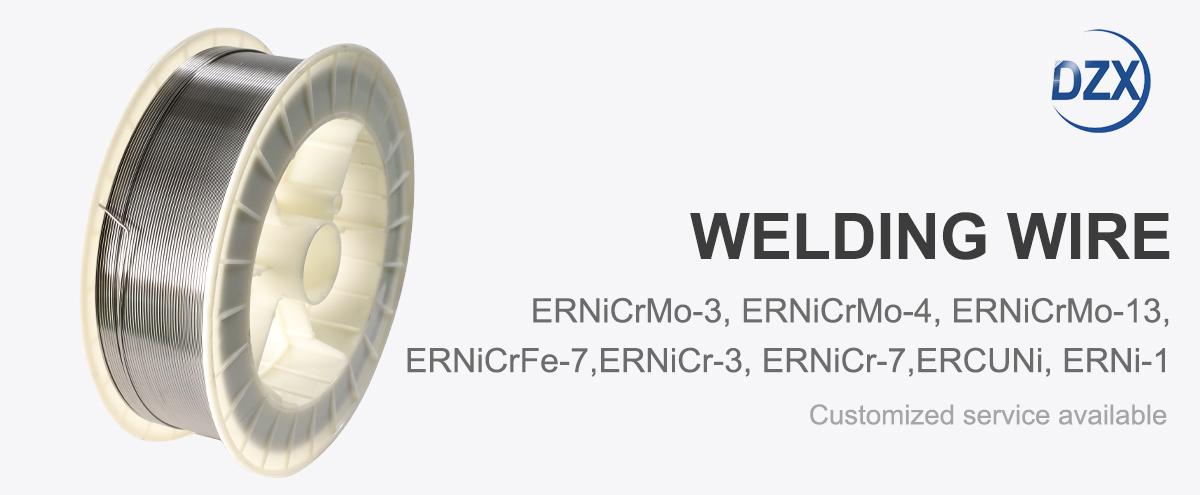
Our ERCuNi Copper-Nickel Alloy Welding Wire is a top-tier choice for marine and offshore applications, built to tackle the toughest corrosive environments with ease. This isn’t just any welding wire—it’s a high-performance alloy of about 67% copper, 30% nickel, and small amounts of iron and manganese, designed to deliver strong, durable welds in seawater-exposed systems. From ship hulls to offshore platforms, our ERCuNi wire ensures welds that stand up to the elements, making it a go-to for industries that demand reliability. We’re proud to offer a product that keeps marine and offshore structures solid and corrosion-free.
For more other size details, pls directly contact us
Let’s dive into what makes our ERCuNi wire so special. It’s a copper-nickel alloy with a composition that balances 67% copper for excellent weldability and 30% nickel for killer corrosion resistance, hitting a tensile strength of 50-60 ksi. With thermal stability up to 350°C, it’s built to handle the heat of welding processes like MIG, TIG, and oxy-fuel. Its corrosion resistance is a standout, shrugging off seawater, biofouling, and pitting that can destroy lesser materials. Whether you’re welding seawater piping or offshore platform components, our ERCuNi wire delivers smooth, stable arcs and strong welds that last in harsh marine environments.
| AWS Classification | Applications |
| ERNiCr-3 | Used for welding 600, 601, and 800 alloys and dissimilar welding between stainless steel and carbon steel |
| ERNiCrFe-7 | Suitable for welding nickel-chromium-iron alloys under ASTM B163, B166, B167, and B168 standards |
| ERNiCrFe-6 | Designed for welding steel to nickel-chromium-iron alloys, as well as stainless steel to nickel-based alloys |
| ERNiCrCoMo-1 | Used for welding nickel-chromium-cobalt-molybdenum alloys and various high-temperature alloys |
| ERNiCrMo-3 | Suitable for nickel alloy, carbon steel, stainless steel, and low alloy steel welding, primarily used for 625, 601, 802 alloys, and 9% nickel alloys |
| ERNi-CI | Used for welding commercially pure nickel, malleable cast iron, and gray cast iron |
| ERCuNi | Suitable for welding 70/30, 80/20, and 90/10 copper-nickel alloys |
| ERNiCu-7 | Used for welding nickel-copper alloys such as B127, B163, B164, and B165 |
| ERNi-1 | Designed for welding pure nickel castings and forgings, including those under ASTM B160, B161, B162, and B163 standards |
| ERNiFeMn-CI | Suitable for welding nodular cast iron, ductile iron, malleable cast iron, and gray cast iron, as well as their dissimilar welding to stainless steel, carbon steel, low alloy steel, and various nickel alloys |
| ERNiCrMo-4 | Used for welding nickel-chromium-molybdenum alloys, or for welding nickel-chromium-molybdenum alloys to steel and other nickel-based alloys |
| ERNiCrMo-11 | uitable for self-welding nickel-chromium-molybdenum alloys, dissimilar welding with steel and other nickel alloys, and also for cladding applications |
| ERNiCrMo-13 | Used for welding low-carbon nickel-chromium-molybdenum alloys |
| ENiCrMo-3 | Designed for welding nickel-chromium-molybdenum alloys, including 625, 800, 801, 825, and 600 |
| ENiCrFe-3 | Used for welding nickel-chromium-iron alloys and for dissimilar welding with carbon steel |
| ENiCrFe-2 | Suitable for welding austenitic steel, ferritic steel, and high-nickel alloys, also used for 9% nickel alloy welding |
| ENiCu-7 | Primarily used for welding nickel-copper alloys and their dissimilar welding with steel |
| ENiCrFe-7 | Ideal for welding 690 (UNS N06690) nickel-chromium-iron alloys |
| ENiCrMo-4 | Designed for C-276 alloy welding and most nickel-based alloys |
| ENiCrCoMo-1 | Suitable for welding nickel-chromium-cobalt-molybdenum alloys and various high-temperature alloys |
| ERCuNi | Used for welding forged or cast 70/30, 80/20, and 90/10 copper-nickel alloys |
| ENiCrMo-13 | Used for welding low-carbon nickel-chromium-molybdenum alloys |
| ENiCrMo-11 | Used for welding low-carbon nickel-chromium-molybdenum alloys |
| Welding Wire Type | Density (g/cm³) | Melting Point (°C) | Electrical Conductivity (% IACS) | Coefficient of Thermal Expansion (10⁻⁶/°C) | Tensile Strength (MPa) | Yield Strength (MPa) | Elongation at Break (%) |
| Carbon Steel Welding Wire | 7.85 | 1450 | 8-10 | 11.8 | 400-550 | 300-400 | 20-25 |
| Stainless Steel Welding Wire | 7.9 | 1350-1450 | 2-5 | 16-17 | 550-650 | 300-400 | 30-40 |
| Aluminum Welding Wire | 2.7 | 600-660 | >60 | 23.1 | 150-200 | 75-100 | >20 |
| Nickel Alloy Welding Wire | 8.4 | 1350-1400 | 1-2 | 13.1 | 600-800 | 400-600 | 30-40 |
| Welding Rod Type | Coating | Electrical Resistivity (10⁻⁶ Ω·cm) | Hardness (HV) | Heat Resistance (°C) | Tensile Strength (MPa) | Yield Strength (MPa) | Elongation at Break (%) |
| Carbon Steel Welding Rod | Acid coated, alkaline coated | 10-15 | 150-200 | < 450 | 400-550 | 300-400 | 20-25 |
| Stainless Steel Welding Rod | Acid coated, alkaline coated | 60-80 | 200-400 | < 800 | 550-750 | 350-450 | 25-35 |
| Cast Iron Welding Rod | Alkaline coated | 90-120 | 250-450 | 300-600 | 300-500 | 150-300 | 10-20 |
| Nickel Alloy Welding Rod | Alkaline coated | 80-100 | 200-300 | < 1200 | 700-900 | 450-650 | 20-35 |
For more other size details, pls directly contact us
In marine and offshore settings, corrosion resistance and durability are non-negotiable, and our ERCuNi wire delivers big time. It resists seawater corrosion and chemical attack, making it ideal for applications like desalination plants and shipbuilding. In lab tests, our wire showed less than 0.5% degradation after 10,000 hours in simulated seawater conditions, making it a top pick for critical welds. Its high weldability ensures smooth, spatter-free results, which is crucial for maintaining structural integrity in offshore rigs or marine vessels. If you’re searching for ERCuNi copper-nickel alloy welding wire for marine and offshore applications, you’re getting a material that minimizes maintenance and maximizes longevity, even in the saltiest, toughest conditions.
The marine and offshore industries are booming, and our ERCuNi wire is riding the wave of key trends. The global shipbuilding market is projected to grow at a 4-6% CAGR through 2030, driven by demand for eco-friendly vessels and offshore energy platforms. The rise of desalination plants to address water scarcity is another big driver, with copper-nickel alloys being the material of choice for their corrosion resistance. Sustainability is also a focus—our wire’s durability reduces the need for frequent repairs, cutting down on material waste and downtime. Emerging fields like offshore wind farms and deep-sea exploration are increasing demand for reliable welding materials. Regions like Asia-Pacific, Europe, and North America are leading the charge, with heavy investments in marine infrastructure and renewable energy projects fueling the need for high-performance wires.
When it comes to applications, our ERCuNi wire is a versatile powerhouse. It’s a staple in welding seawater piping for desalination plants, where its corrosion resistance ensures leak-free systems. In shipbuilding, it’s used for hulls and propeller shafts, delivering welds that withstand constant saltwater exposure. Offshore platforms rely on it for structural components like risers and heat exchangers, where its strength and durability shine. We’ve also supplied it for marine heat exchangers and chemical processing equipment, where it handles corrosive fluids with ease. We can customize the wire to your needs—available in MIG sizes (0.8-2.0 mm) or TIG sizes (1.6-9.5 mm), with options for specific spooling or coatings to enhance performance in your welding setup.
What sets our company apart is our relentless focus on quality and innovation. We produce our ERCuNi wire with strict quality controls, from alloy blending to final testing, ensuring every batch meets the highest marine standards, like AWS A5.7. Our advanced manufacturing processes deliver consistent wire temper and smooth surfaces, reducing arc instability and weld imperfections. Compared to standard wires, our ERCuNi wire offers superior corrosion resistance and weld strength, thanks to our proprietary production techniques. We’re also big on sustainability, using optimized processes to minimize waste while maintaining top-notch quality. Our customers love our flexibility—rapid prototyping, custom packaging, and just-in-time delivery keep your projects on track. Our team of welding experts is always ready to collaborate, whether you’re designing a new ship component or optimizing a desalination system.
| Parameter | ERCuNi Copper-Nickel Wire | Pure Copper Wire | Stainless Steel 316 Wire |
|---|---|---|---|
| Composition | ~67% Cu, 30% Ni, 1-3% Fe/Mn | 99.9% Cu | 16-18% Cr, 10-14% Ni, 2-3% Mo |
| Density (g/cm³) | 8.94 | 8.96 | 8.0 |
| Tensile Strength (ksi) | 50-60 | 30-50 | 75-90 |
| Electrical Conductivity (% IACS) | 5-10 | 100 | 2-3 |
| Corrosion Resistance | Excellent; resists seawater, biofouling | Poor in seawater | Moderate; prone to pitting |
| Thermal Stability (°C) | Up to 350 | Up to 1085 | Up to 1400 |
| Weldability | High; suitable for MIG/TIG | Moderate; prone to cracking | High; requires specific fluxes |
| Cost Factor | Moderate | Low | Low |
| Typical Applications | Seawater piping, shipbuilding | Electrical wiring | General industrial welds |
The advantages of our ERCuNi wire are hard to beat. Its corrosion resistance and high strength make it a standout for marine and offshore welds, often outlasting pure copper by a factor of five in seawater tests. The nickel content gives it an edge over copper wires, ensuring welds that resist pitting and biofouling. We’ve helped clients cut maintenance costs by 25% by switching to our wire for critical marine applications like seawater piping. With trends leaning toward greener, more durable marine infrastructure, our wire is ready to support the future, from offshore wind farms to advanced desalination systems. It’s a material that’s as reliable as it is forward-thinking.
For more other size details, pls directly contact us
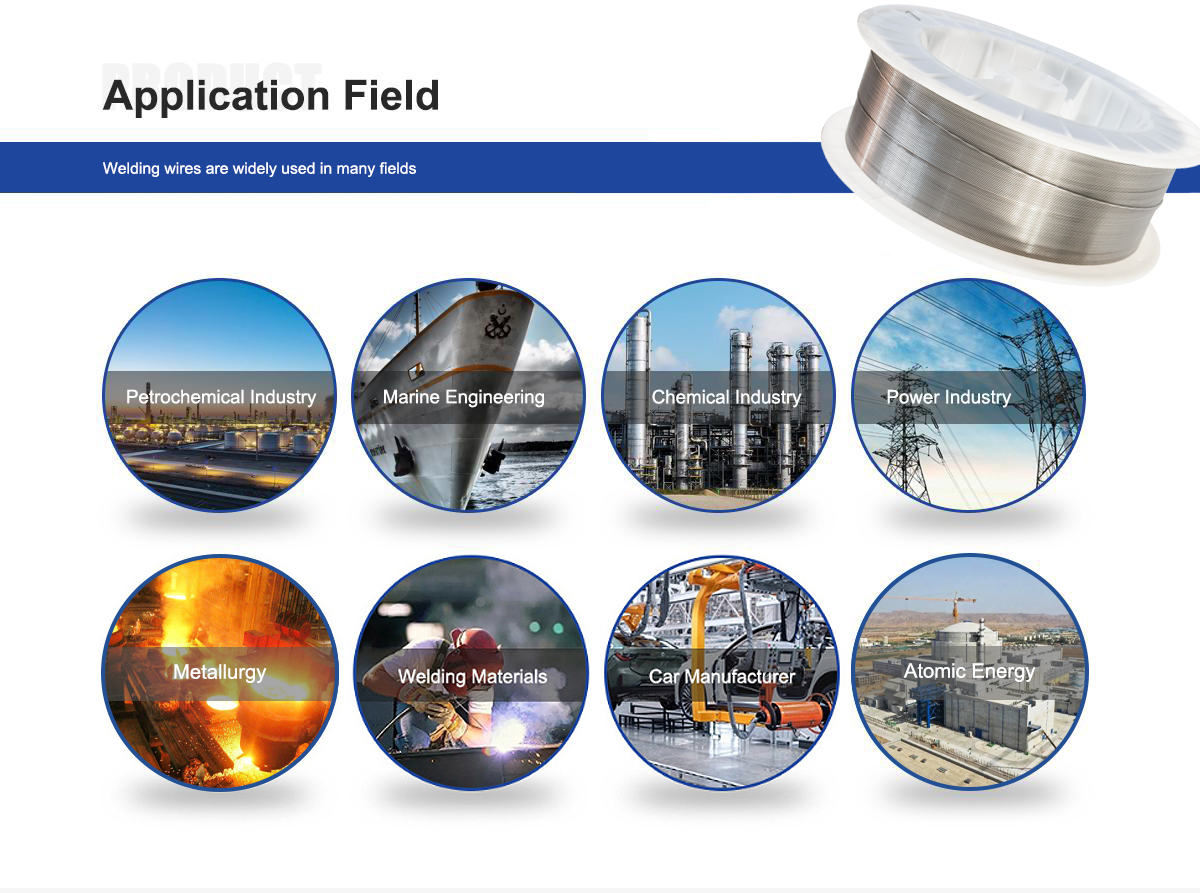
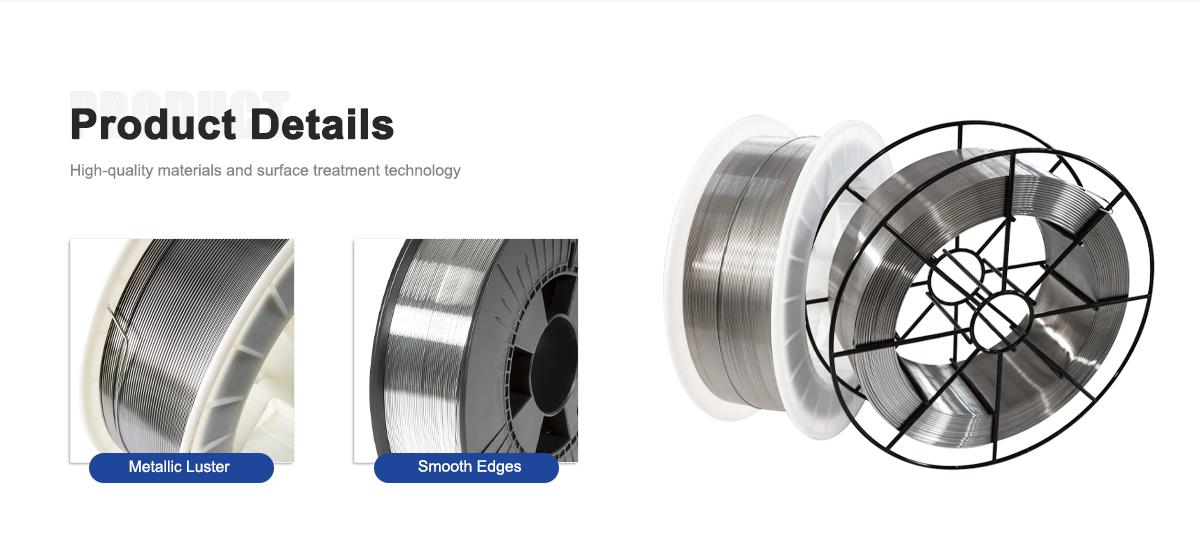
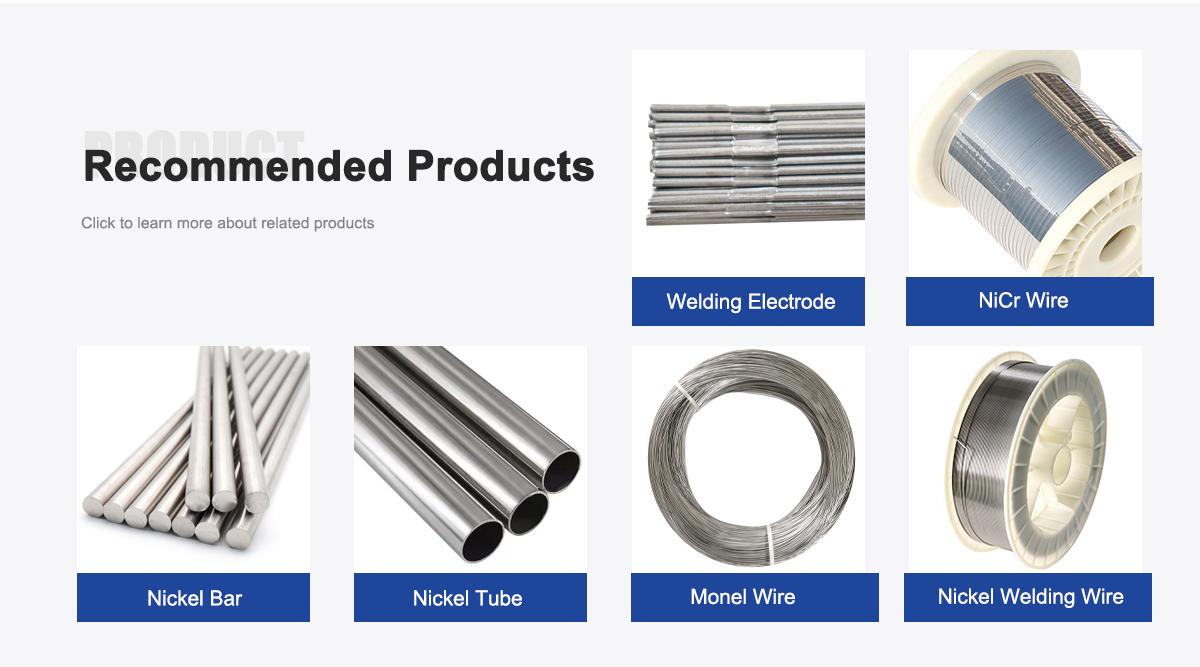
About Us:
Our 12,000㎡ factory is equipped with complete capabilities for research, production, testing, and packaging. We strictly adhere to ISO 9001 standards in our production processes, with an annual output of 1,200 tons. This ensures that we meet both quantity and quality demands. Furthermore, all products undergo rigorous simulated environment testing including high temperature, high pressure, and corrosion tests before being dispatched, ensuring they meet customer specifications. We also provide chemical analysis reports for every FeCrAl alloy, NiCr alloy, and other products purchased.
For all our clients, we offer timely and multilingual after-sales support and technical consulting, helping you resolve any issues swiftly and efficiently.
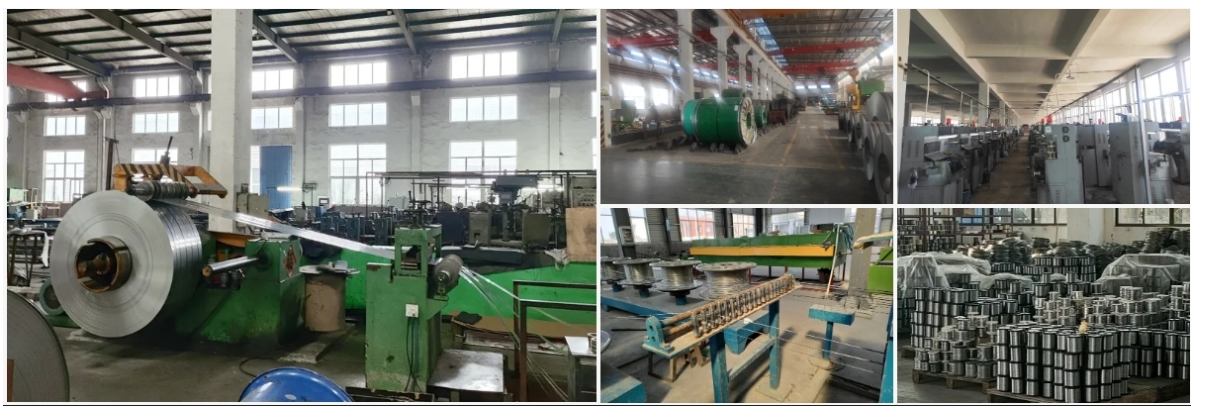
Client Visits
Building Stronger Partnerships
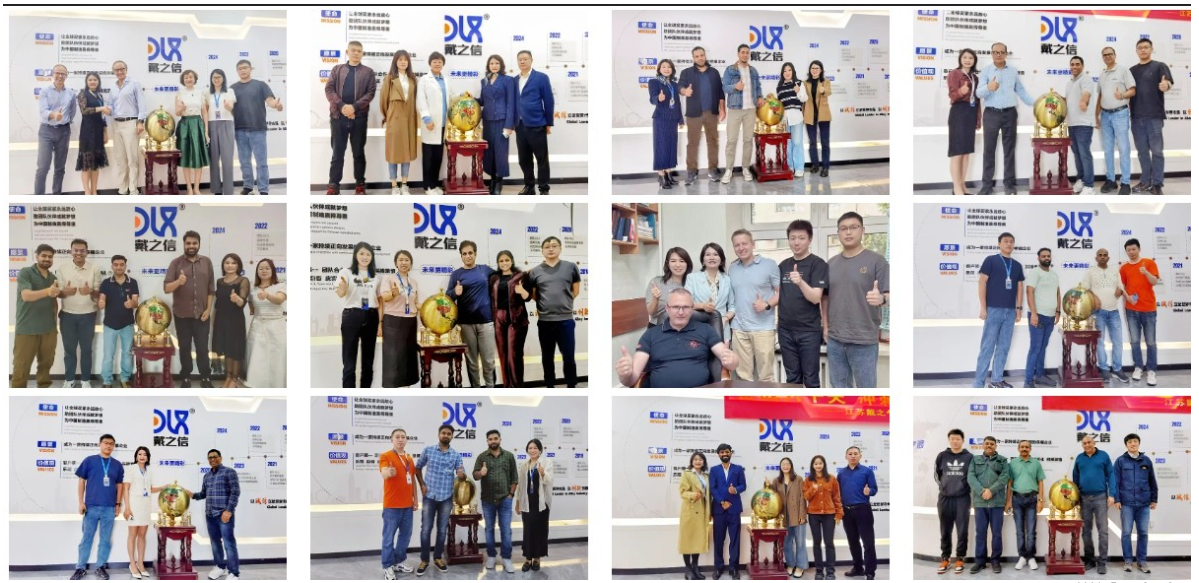
We support all kinds of testing:
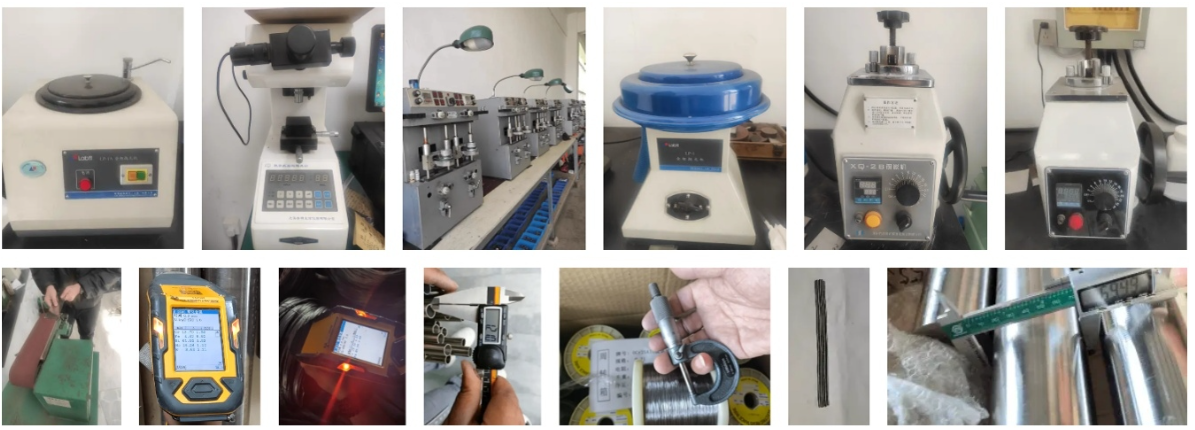

What is the composition of ERCuNi welding wire?
It’s a copper-nickel alloy with approximately 67% copper, 30% nickel, and small amounts of iron and manganese.
What are the key properties of ERCuNi welding wire?
It offers excellent corrosion resistance, high tensile strength (50-60 ksi), good weldability, and thermal stability up to 350°C.
What marine and offshore applications use ERCuNi wire?
It’s used for welding seawater piping, ship hulls, offshore platform components, and desalination plant equipment.
How does ERCuNi wire perform in corrosive marine environments?
It resists seawater corrosion, biofouling, and pitting, ensuring durable welds in harsh marine conditions.
What industry trends are driving demand for ERCuNi wire?
Growth in offshore energy, shipbuilding, and desalination industries is increasing demand for corrosion-resistant welding materials.
Is ERCuNi wire suitable for dissimilar metal welding?
Yes, it’s ideal for joining copper-nickel alloys to nickel alloys or carbon steel with a barrier layer.
How is ERCuNi wire customized for marine applications?
It’s available in various diameters (0.8-2.0 mm for MIG, 1.6-9.5 mm for TIG) and can be spooled or cut to specific lengths.
What makes ERCuNi wire better than copper wire for marine welding?
The nickel content enhances corrosion resistance and strength, making it ideal for seawater-exposed welds.